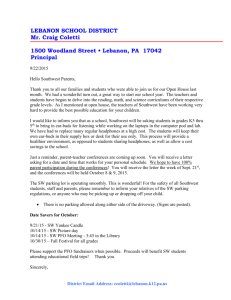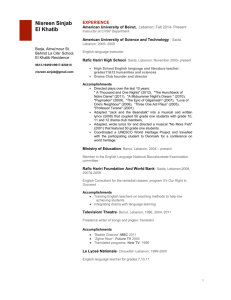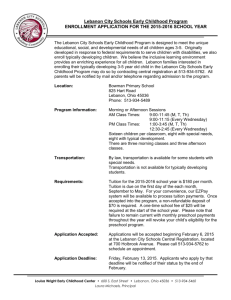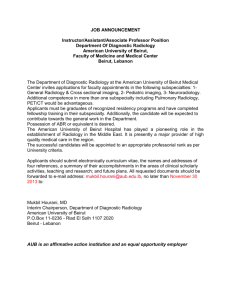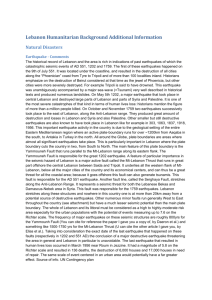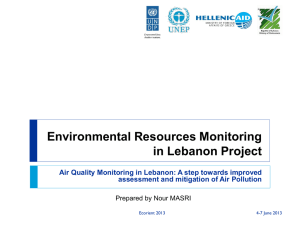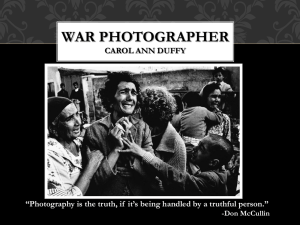Other reference material
advertisement
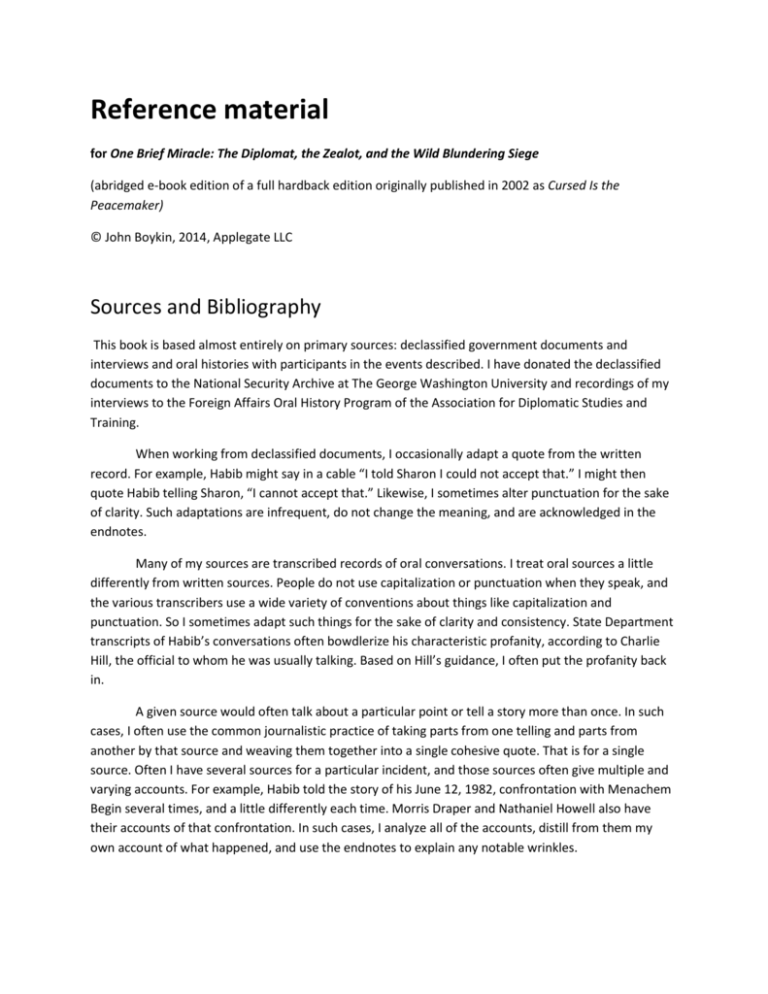
Reference material for One Brief Miracle: The Diplomat, the Zealot, and the Wild Blundering Siege (abridged e-book edition of a full hardback edition originally published in 2002 as Cursed Is the Peacemaker) © John Boykin, 2014, Applegate LLC Sources and Bibliography This book is based almost entirely on primary sources: declassified government documents and interviews and oral histories with participants in the events described. I have donated the declassified documents to the National Security Archive at The George Washington University and recordings of my interviews to the Foreign Affairs Oral History Program of the Association for Diplomatic Studies and Training. When working from declassified documents, I occasionally adapt a quote from the written record. For example, Habib might say in a cable “I told Sharon I could not accept that.” I might then quote Habib telling Sharon, “I cannot accept that.” Likewise, I sometimes alter punctuation for the sake of clarity. Such adaptations are infrequent, do not change the meaning, and are acknowledged in the endnotes. Many of my sources are transcribed records of oral conversations. I treat oral sources a little differently from written sources. People do not use capitalization or punctuation when they speak, and the various transcribers use a wide variety of conventions about things like capitalization and punctuation. So I sometimes adapt such things for the sake of clarity and consistency. State Department transcripts of Habib’s conversations often bowdlerize his characteristic profanity, according to Charlie Hill, the official to whom he was usually talking. Based on Hill’s guidance, I often put the profanity back in. A given source would often talk about a particular point or tell a story more than once. In such cases, I often use the common journalistic practice of taking parts from one telling and parts from another by that source and weaving them together into a single cohesive quote. That is for a single source. Often I have several sources for a particular incident, and those sources often give multiple and varying accounts. For example, Habib told the story of his June 12, 1982, confrontation with Menachem Begin several times, and a little differently each time. Morris Draper and Nathaniel Howell also have their accounts of that confrontation. In such cases, I analyze all of the accounts, distill from them my own account of what happened, and use the endnotes to explain any notable wrinkles. How and when to use quotation marks is a judgment call, so let me spell out the practice I have tried to follow. Virtually every thought and piece of information in this book is based on material from some source. I generally put sources’ words in quotation marks. But there comes a point at which quotation marks would so pepper the text as to do more harm than good by becoming obtrusive. The problem would be compounded by having to include the name and further identification of each source—often two or three for a single sentence—even when the name of the source is irrelevant to the point at hand. So my practice is to use quotation marks when the source’s words are particularly colorful or eloquent or otherwise distinctive, when they express a strong opinion, or when they say something that clearly needs to be associated with them rather than with me. I do not use quotation marks, however, when picking up more pedestrian information: “Phil didn’t talk to the press,” for example, may be verbatim what some source said, but in my judgment does not warrant quotation marks because it is just a plain vanilla piece of information. Whether quotation marks are used or not, I carefully identify each source in the endnotes. In all of these judgment calls, my guide has been clarity for the general reader. Scholars and other serious readers should treat the endnotes as an intrinsic part of the text, since that is where I present explanations and elaboration and subplots, detail the sources, and note any significant disagreements among sources. The manuscript has been reviewed for accuracy by several of my principal sources. INTERVIEWS This list includes everyone I interviewed for the original full hardback book except for some who asked not to be identified by name. Some of these were sources about Philip Habib’s years prior to or following his Middle East mission. The abridged e-book edition omits most of that material. Recordings of most of these interviews are housed in the Foreign Affairs Oral History Program of the Association for Diplomatic Studies and Training. Arias Sánchez, Oscar Armacost, Michael Ashley, Fred Atherton, Alfred (Roy) Ball, George Barrett, Robert Beinin, Joel Beyda, Joe Bider, Lori Boschwitz, Rudolph Boulos, Al Brown, Fred Z. Bundy, William Burns, John Buss, Claude Cheitlin, Melvin Colby, William Conroy, Raymond Crocker, Ryan Dean, John Gunther Dillon, Robert Djerejian, Edward Draper, Morris Duly, Gilda Dusclaud, Michel Eagleburger, Lawrence Easterbrook, Paul Eilts, Herman Gaucher, Edward Geske, Graydon Grazi, Jack Green, Marshall Grove, Brandon Habib, Alice Habib, Marjorie Habib, Philip Habib, Phyllis Haig, Alexander Hall, Winifred Hamilton, John Helble, John Hendee, John Hill, Charles Holbrooke, Richard Howell, Nathaniel Jabara, Evelyn Jabara, Raymond Jacobs, Joseph Johnston, Robert Jungel, Paul Kadishai, Yehiel Katzenbach, Nicholas Kerlek, George Kim, Eva Kirby, William Kissinger, Henry Kliewer, Betty Kliewer, Robert Kreczko, Alan Kuehner, Roy Lake, Anthony Lantos, Tom Lee, Faith Lewis, Samuel Lugar, Richard Marbach, Marty Matthews, John McArthur, George McManaway, Clay McNaughton, Finley Mead, James Michaels, Susan Habib Miller, Robert Miller, Thomas J. Moore, Elaine Habib Murphy, Elva Negroponte, John O’Donohue, Daniel Orebaugh, Walter Owen, Robert Paganelli, Robert Parker, Richard Pascoe, Dorothy Pell, Claiborne Rockefeller, David Rosenthal, James Rusk, Dean Santé, Henry Saunders, Harold Sehulster, James Shepard, William Shultz, George Sicherman, Harvey Slusher, Edward Smith, Charles Solarz, Stephen Spiridon, George Sullivan, William Tarnoff, Peter Toomey, Isabelle Spiridon Tueni, Ghassan Vance, Amy Vance, Cyrus Veliotes, Nicholas Ward, Robert Weinberger, Caspar Weyand, Frederick Wharton, David Whitehouse, Charles Wisner, Frank Yaacobi, Gad Zorthian, Barry ORAL HISTORIES From the Association for Diplomatic Studies and Training’s Foreign Affairs Oral History Program, housed at the Lauinger Library, Georgetown University Brown, Dean Brown, Frederick Z. Burke, John Cumming, Isabel Dillard, Dianne Dillon, Robert Draper, Morris Du Vivier, Paul Eilts, Hermann Fairbanks, Richard Green, Marshall Grove, Brandon Habib, Philip C. Hummel, Arthur Keeley, R. Koren, H. Lacey, J. Lehmann, Wolf Levine, Robert Don Lewis, Samuel McDonald, D. Miller, Robert Pike, Douglas Ryan, Robert Sigur, Gaston Sisco, Joseph Sober, Sidney Underhill, Frank Veliotes, Nicholas Vest, George S. From the Lyndon Baines Johnson Library Bruce, K.E. David. AC 73-39 Bundy, William P. AC 74-187 Dillon, D. Douglas. AC 74-12 Harriman, W. Averell. Katzenbach, Nicholas D. AC 78-24 Rusk, Dean. I through IV, AC 74-245 Vance, Cyrus R. Zorthian, Barry. AC 79-45; AC 82-37; AC 84-63; AC 84-64, 84-65 PHILIP HABIB INTERVIEWS With John Boykin, 12-20-83 and 1-10-84. An edited version appeared in The Stanford Magazine, Spring 1984. With Michel Dusclaud, published in French in Politique Internationale, no. 28, édition d’été 1985; translated for the author by Susan Bree With Stuart E. Eizenstat, 5-13-92 With Harry Kreisler, 5-14-82, Conversations with History, Institute of International Studies, University of California, Berkeley. “The Work of Diplomacy: Conversation with Philip Habib.” With Edward Mulcahy, 5-25-84 and 5-29-84 for the Association for Diplomatic Studies and Training’s Foreign Affairs Oral History Program, housed at the Lauinger Library, Georgetown University With Richard Parker, 5-9-90, for Parker’s book The Politics of Miscalculation in the Middle East. Parker had been ambassador to Lebanon. With Ghassan Tueni, 6-28-87. This interview was intended to be the basis of Habib’s memoirs. The idea was that his good friend Tueni, publisher of An-Nahar newspaper in Beirut and Lebanon’s former ambassador to the UN, would publish the memoirs. Nothing came of the project after this interview. GOVERNMENT DOCUMENTS Hundreds of cables and other individual documents too numerous to cite individually here, declassified by the State Department, National Security Council, FBI, and other agencies. Each is cited in the notes by city of origin, number, and date/time. Most cables cited use military time, with a 24-hour clock, so 21 means 9 p.m. Z stands for “Zulu,” shorthand for Greenwich Mean Time. Example: 062147Z Jul 82 means July 6, 1982, at 9:47 p.m. GMT. I have donated the documents to the National Security Archives at The George Washington University. American Foreign Policy; Current Documents. 1982. Chapter 11, Document 391, “Plan for the Departure of the PLO from Beirut.” US Department of State. Briefing on Central American Peace Initiative, Stenographic Transcript of Hearings Before the Committee on Foreign Relations, Subcommittee on Westrn Hemisphere and Peace Corps Affairs, United States Senate, June 16, 1987. Washington, DC: Anderson Reporting. Provided by The National Archives, Records of the U.S. Senate, Record Group 46. Recent Events Concerning the Arias Peace Proposal, Hearing and Markup Before the Committee on Foreign Affairs and its Subcommittee on Western Hemisphere Affairs, House of Representatives, One Hundredth Congress, First Session on H. Con. Res. 146, July 9, 15, and 28, 1987 Review of Adequacy of Security Arrangements for Marines in Lebanon and Plans for Improving That Security, Hearings Before the Committee on Armed Services and the Investigations Subcommittee of the Committee on Armed Services, House of Representatives, Ninety-Eighth Congress, First Session, November 1, 2, 12, 18; December 8, 9, 14, 15, 1983 BOOKS Though my text is based mostly on primary sources, I do draw on many of these books. All were helpful in the course of my research, whether I quote from them or not. Abramson, Rudy. Spanning the Century: The Life of W. Averell Harriman 1891-1986. New York: William Morrow and Company, 1992. Ambrose, Stephen E. Nixon: The Education of a Politician, 1913-1962. New York: Simon and Schuster, 1987. Arias Sánchez, Oscar. Horizons of Peace. San Jose, Costa Rica: Fundación Arias para la Paz y el Progreso Humano (Arias Foundation for Peace and Progress of Humanity), 1994. Attwood, William. The Reds and the Blacks: A Personal Adventure. New York: Harper & Row, 1967. Ball, George W. Error and Betrayal in Lebanon: An Analysis of Israel’s Invasion of Lebanon and the Implications for U.S.-Israeli Relations. Washington: Foundation for Middle East Peace, 1984. Ball, George W. The Past Has Another Pattern: Memoirs. New York: W.W. Norton, 1982. Ball, George W., and Douglas B. Ball. The Passionate Attachment: America’s Involvement with Israel, 1947 to the Present. New York: W.W. Norton, 1992. Barakat, Halim. Toward a Viable Lebanon. Washington, DC: Center for Contemporary Arab Studies, Georgetown University. Bavly, Dan, and Eliahu Salpeter. Fire in Beirut: Israel’s War in Lebanon with the PLO. Briarcliff Manor, NY: Stein & Day Publishers, 1984. Benziman, Uzi. Sharon: An Israeli Caesar. New York: Adama Books, 1985. Boettcher, Robert, with Gordon L. Freedman. Gifts of Deceit: Sun Myung Moon, Tongsun Park, and the Korean Scandal. New York: Holt, Rinehart, and Winston, 1980. Brinkley, Douglas. Dean Acheson: The Cold War Years 1953-71. New Haven and London: Yale University Press, 1992. Bundy, William. A Tangled Web: The Making of Foreign Policy in the Nixon Presidency. New York: Hill & Wang, a division of Farrar, Straus & Giroux, 1998. Bush, George, with Victor Gold. Looking Forward: An Autobiography. New York: Doubleday, 1987. Buss, Claude A. Cory Aquino and the People of the Philippines. Stanford, California: The Portable Stanford, 1987. Buss, Claude A. The United States and the Republic of Korea: Background for Policy. Stanford, California: Hoover Press, 1982. Cannon, Lou. President Reagan: The Role of a Lifetime. New York: Simon & Schuster, 1991. Clifford, Clark, with Richard Holbrooke. Counsel to the President: A Memoir. New York: Doubleday, 1991. Clifton, Tony, and Catherine Leroy. God Cried. London: Quartet Books Ltd., 1983 Cobban, Helena. The Superpowers and the Syrian-Israeli Conflict: Beyond Crisis Management? New York: Praeger, Center for Strategic and International Studies, 1991. Cronkite, Walter. A Reporter’s Life. New York: Alfred A. Knopf, 1996. Davis, M. Thomas. 40 Km Into Lebanon: Israel’s 1982 Invasion. Washington, DC: National Defense University Press, a National Security Affairs Monograph, 1987. Diem, Bui, with David Chanoff. In the Jaws of History. Boston: Houghton Mifflin, 1987. Drysdale, Alasdair, and Raymond A. Hinnebusch. Syria and the Middle East Peace Process. New York: Council on Foreign Relations, 1991. Dunnigan, James F., and Austin Bay. A Quick & Dirty Guide to War. New York: William Morrow and Co., 1985, 1986. Eisenhower, Julie Nixon. Pat Nixon: The Untold Story. New York: Simon and Schuster, 1986. Evron, Yair. War and Intervention in Lebanon: The Israeli-Syrian Deterrence Dialogue. Baltimore: The Johns Hopkins University Press, 1987. Fisk, Robert. Pity the Nation: The Abduction of Lebanon. New York: Atheneum, 1990. Friedman, Thomas L. From Beirut to Jerusalem. New York: Doubleday, 1989. Gabriel, Richard A. Operation Peace for Galilee: The Israeli-PLO War in Lebanon. New York: Hill and Wang, 1984. Gibbons, William Conrad. The U.S. Government and the Vietnam War: Executive and Legislative Roles and Relationships, Part III: January-July 1965. Princeton, NJ: Princeton University Press, 1989. Gilbert, Martin. Israel: A History. New York: William Morrow and Company, 1998. Gilmour, David. Lebanon: The Fractured Country. Oxford: Martin Robertson, 1983. Glueck, Grace, and Paul Gardner. Brooklyn: People and Places, Past and Present. New York: Harry N. Abrams, 1991. Gordon, David C. The Republic of Lebanon: Nation in Jeopardy. Boulder, CO: The Westview Press, 1983. Gowers, Andrew, and Tony Walker. Behind the Myth: Yasser Arafat and the Palestinian Revolution. Brooklyn: Olive Branch Press, 1992. Grant, Zalin. Facing the Phoenix. New York and London: W.W. Norton & Company, 1991. Grunwald, Henry. One Man’s America. New York: Doubleday, 1997 Gutman, Roy. Banana Diplomacy: The Making of American Policy in Nicaragua 1981-1987. New York: Simon and Schuster, 1988 Haig, Alexander M., Jr. Caveat: Realism, Reagan, and Foreign Policy. New York: Macmillan, 1984. Hammel, Eric M. The Root: The Marines in Beirut, August 1982-February 1984. New York: Harcourt Brace Jovanovich, 1985. Hart, Alan. Arafat: Terrorist or Peacemaker. London: Sidgewick & Jackson, 1984. Hatch, Alden. The Lodges of Massachusetts. New York: Hawthorn Books, Inc., 1973. Henry, Paul-Marc. Les Jardiniers de L’Enfer [The Gardeners of Hell]. Olivier Orban, 1984 (no place). Herring, George C., ed. The Secret Diplomacy of the Vietnam War: The Negotiating Volumes of the Pentagon Papers. Austin, Texas: University of Texas Press, 1983. Herzog, Chaim. The Arab-Israeli Wars. Hickey, Gerald Cannon. Free in the Forest: Ethnohistory of the Vietnamese Central Highlands 1954-1976. New Haven and London: Yale University Press, 1982. Holbrooke, Richard. To End a War. New York: Random House, 1998. Hosmer, Stephen T., Konrad Kenne, Brian M. Jenkins. The Fall of South Vietnam: Statements by Vietnamese Military and Civilian Leaders. New York: Crane, Russak & Co., 1980. International Commission, The. Israel in Lebanon: The Report of the International Commission to enquire into reported violations of International Law by Israel during its invasion of the Lebanon. London: The Ithaca Press, 1983. Isaacson, Walter. Kissinger: A Biography. New York: Simon & Schuster, 1992. Isaacson, Walter, and Evan Thomas. The Wise Men: Six Friends and the World They Made. New York: Simon and Schuster, 1986. Israeli, Raphael, ed. PLO in Lebanon: Selected Documents. London: Weidenfeld and Nicolson,1983. Jacobs, Joseph J. The Anatomy of an Entrepreneur: Family, Culture, and Ethics. San Francisco: ICS Press, 1991. Jansen, Michael. The Battle of Beirut: Why Israel Invaded Lebanon. Boston: South End Press, 1982. Jenkins, Brian M. Embassies Under Siege: A Review of 48 Embassy Takeovers, 1971-1980. Santa Monica, California: The Rand Corporation, 1981. Johnson, Lyndon Baines. The Vantage Point: Perspectives of the Presidency 1963-1969. New York: Holt, Rinehart and Winston, 1971. Jones, Howard. The Course of American Diplomacy: From the Revolution to the Present. New York: Franklin Watts, Inc., 1985. Kalb, Marvin, and Elie Abel. Roots of Involvement: The U.S. in Asia 1784-1971. New York: W.W. Norton and Co., 1971. Kalb, Marvin, and Bernard Kalb. Kissinger. Boston: Little, Brown and Company, 1974. Karnow, Stanley. In Our Image: America’s Empire in the Philippines. New York: Random House, 1989. Karnow, Stanley. Vietnam: A History. New York: Penguin Books, 1983. Khalidi, Rashid. Under Siege: PLO Decisionmaking During the 1982 War. New York: Columbia University Press, 1986. Kissinger, Henry. White House Years. Boston: Little, Brown and Co., 1979. Kissinger, Henry. Years of Upheaval. Boston: Little, Brown and Co., 1982. Komisar, Lucy. Corazon Aquino: The Story of a Revolution. New York: George Braziller, 1987. LaFeber, Walter. Inevitable Revolutions: The United States in Central America. Second ed. New York: W.W. Norton and Co., 1993. Laqueur, Walter, and Barry Rubin, eds. The Israel-Arab Reader: A Documentary History of the Middle East Conflict. Revised and updated ed. New York: Penguin Books, 1991. Lodge, Henry Cabot. The Storm Has Many Eyes: A Personal Narrative. New York: W.W. Norton & Co., 1973. Lugar, Richard G. Letters to the Next President. New York: Simon and Schuster, 1988 Mack, Dayton, and Charles Stuart Kennedy. American Ambassadors in a Troubled World: Interviews with Senior Diplomats. Westport, CT: Greenwood Press, 1992. Mackey, Sandra. Lebanon: Death of a Nation. New York: Anchor Books, 1989. Makdisi, Jean Said. Beirut Fragments: A War Memoir. New York: Persea Books, 1990. Maoz, Moshe, and Avnery Yaniv, eds. Syria Under Assad. New York: St. Martin’s Press, 1986. Massoulie, Francois. Middle East Conflicts. Brooklyn: Interlink Books, Interlink Illustrated Histories series, 1999. McDermott, Anthony, and Kjell Skjelsbaek, eds. The Multinational Force in Beirut 1982-1984. Miami: Florida International University Press, 1991. McDowall, David. Lebanon: A Conflict of Minorities. Report No. 61. Minority Rights Group. McFarlane, Robert C. Special Trust. New York: Cadell & Davies, 1994. Mikdadi, Lina. Surviving the Siege of Beirut: A Personal Account. London: Onyx Press, 1983. Mosher, Frederick C. Introduction to John E. Harr, The Anatomy of the Foreign Service—a Statistical Profile. Carnegie Endowment for International Peace, Foreign Affairs Personnel Study No. 4, 1965. Newman, Barbara, with Barbara Rogan. The Covenant: Love and Death in Beirut. New York: Crown Publishers, 1989. New York Times, The. The Pentagon Papers. New York: Bantam Books, 1971. Nixon, Richard. RN: The Memoirs of Richard Nixon. New York: Grosset & Dunlap, 1978. Norton, Augustus Richard. Amal and the Shi’a: Struggle for the Soul of Lebanon. Austin, Texas: University of Texas Press, 1987. Oberdorfer, Don. Tet! The Story of a Battle and its Historic Aftermath. Garden City, New York: Doubleday and Co., 1971. Orfalea, Gregory. Before the Flames: A Quest for the History of Arab Americans. Austin, Texas: University of Texas Press, 1988. Pakradouni, Karim. La Paix Manquée: Le Mandat d’Elias Sarkis (1976-1982). [No city] Editions FMA, second ed., 1984. Parker, Richard B. The Politics of Miscalculation in the Middle East. Indianapolis: Indiana University Press, 1993. Petran, Tabitha. The Struggle Over Lebanon. New York: Monthly Review Press, 1987. Pilger, John. The Last Day: America’s Final Hours in Vietnam. New York: Vintage Books, 1975. Pintak, Larry. Beirut Outtakes: A TV Correspondent’s Portrait of America’s Encounter with Terror. Lexington, Mass.: D.C. Heath & Co., Lexington Books, 1988. Pratt, Julius W., Vincent P. DeSantis, Joseph M. Siracusa. A History of United States Foreign Policy. Englewood Cliffs, New Jersey: Prentice Hall, 1980. Quandt, William B. Camp David: Peacemaking and Politics. Washington, DC: The Brookings Institution, 1986. Quandt, William B., ed. The Middle East: Ten Years After Camp David. Washington, DC: The Brookings Institution, 1988. Rabinovich, Itamar. The War for Lebanon, 1970-1985. Revised Edition. Ithaca, New York: Cornell University Press, 1984, 1985. Radvány, János. Delusion and Reality: Gambits, Hoaxes, and Diplomatic One-Upsmanship in Vietnam. South Bend, Indiana: Gateway Editions, Ltd., 1978. Randal, Jonathan C. Going All the Way: Christian Warlords, Israeli Adventurers, and the War in Lebanon. New York: The Viking Press, 1983. Re-issued in revised and up-dated edition as The Tragedy of Lebanon: Christian Warlords, Israeli Adventurers and American Bunglers. London: Thke Hogarth Press, 1990. Reagan, Ronald. An American Life. New York: Simon & Schuster, 1990. Rusk, Dean, as told to Richard Rusk, edited by Daniel S. Papp. As I Saw It. New York: W.W. Norton, 1990. Sachar, Howard M. A History of Israel, Vol. II: From the Aftermath of the Yom Kippur War. New York: Oxford University Press, 1987. Salem, Elie. Violence and Diplomacy in Lebanon: The Troubled Years, 1982-1988. London: I.B. Tauris Publishers; New York: St. Martin’s Press, 1995. Schiff, Ze’ev, and Ehud Ya’ari. Israel’s Lebanon War. New York: Simon & Schuster, 1984. Schoenbaum, David. The United States and the State of Israel. New York and Oxford: Oxford University Press. Schoenbaum, Thomas J. Waging Peace & War: Dean Rusk in the Truman, Kennedy & Johnson Years. New York: Simon and Schuster, 1988. Seale, Patrick. Asad: The Struggle for the Middle East. Berkeley, California: University of California Press, 1988. Shamir, Yitzhak. Summing Up: An Autobiography. Boston: Little, Brown, 1994. Sharon, Ariel, with David Chanoff. Warrior: An Autobiography. New York: Simon and Schuster, 1989. Sheehan, Neil. A Bright and Shining Lie: John Paul Vann and America in Vietnam. New York: Random House, 1988. Shultz, George. Turmoil and Triumph: My Years as Secretary of State. New York: Charles Scribner’s Sons, 1993. Silver, Eric. Begin: The Haunted Prophet. New York: Random House, 1984. Simpson, James B., ed. Simpson’s Contemporary Quotations: The Most Notable Quotes Since 1950. Boston: Houghton Mifflin, 1988. Snepp, Frank. Decent Interval: An Insider’s Account of Saigon’s Indecent End Told by the CIA’s Chief Strategy Analyst in Vietnam. New York: Vintage Books, 1978. Staar, Richard F., ed. Public Diplomacy: USA Versus USSR. Stanford, California: Hoover Institution Press, 1986. Stein, Kenneth W., and Samuel W. Lewis, with Sheryl J. Brown. Making Peace Among Arabs and Israelis. Washington, DC: United States Institute of Peace, 1991. Strober, Deborah Hart, and Gerald S. Strober. Reagan: The Man and His Presidency. Boston: Houghton Mifflin Co., 1998 Strober, Gerald S., and Deborah Hart Strober. Nixon: An Oral History of His Presidency. New York: HarperCollins, 1994. Tanter, Raymond. Who’s at the Helm? Lessons of Lebanon. Boulder, San Francisco, Oxford: Westview Press, 1990. Teicher, Howard, and Gayle Radley Teicher. Twin Pillars to Desert Storm: America’s Flawed Vision in the Middle East from Nixon to Bush. New York: William Morrow and Co., 1993. Thalken, Thomas T., ed. The Problems of Lasting Peace Revisited: A Scholarly Conference. West Branch, Iowa: Herbert Hoover Presidential Library Assoc., Inc., 1986. Tillman, Seth P. The United States in the Middle East: Interests and Obstacles. Timerman, Jacobo. The Longest War: Israel in Lebanon. New York: Alfred A. Knopf, 1982. UN Yearbook 1982. Vance, Cyrus. Hard Choices: Critical Years in America’s Foreign Policy. New York: Simon and Schuster, 1983. Warshaw, Mal. Tradition: Orthodox Jewish Life in America. New York: Schocken Books, 1976. Weinberger, Caspar. Fighting for Peace: Seven Critical Years in the Pentagon. New York: Warner Books, 1990. Westmoreland, William. A Soldier Reports. Garden City, New York: Doubleday & Co., 1976. Willensky, Elliot. When Brooklyn Was the World: 1920-1957. New York: Harmony Books, 1986. Wright, Robin. Sacred Rage: The Crusade of Modern Islam. New York: Simon & Schuster, 1985. Yaniv, Avner. Dilemmas of Security: Politics, Strategy, and the Israeli Experience in Lebanon. New York: Oxford University Press, 1987. Young, Ronald J. Missed Opportunities for Peace: U.S. Middle East Policy 1981-86. Philadelphia: American Friends Service Committee, 1987. Yuzo, Itagaki, Oda Makoto, and Shiboh Mitsukazu, eds. The Israeli Invasion of Lebanon, 1982: Inquiry by the International People’s Tribunal, Tokyo. Tokyo: Sanyusha, 1983. Zamir, Meir. The Formation of Modern Lebanon. Ithaca, New York: Cornell University Press, 1985. THESES AND DISSERTATIONS Beck, William Granville. U.S. Foreign Policy in Lebanon Under the Reagan Administration 1981-1989. George Washington University, Department of Political Science, 1989. Dammarell, Anne. Hidden Fears, Helpful Memories: Aftermath of the 1983 Bombing of the United States Embassy in Beirut. Georgetown University, School for Summer and Continuing Education, 1994. Hopkins, Kevin. Philip C. Habib: Presidential Emissary to the Middle East. PLO Withdrawal Negotiations: Beirut, Summer 1982. Georgetown Unversity, Institute for the Study of Diplomacy, 1992. Korbani, Agnes Gerges. Presidential Working-System Style, Cognition, and Foreign Policy: A Comparative Study of U.S. Decisions to Intervene Militarily in Lebanon in 1958 and 1982. Northwestern University, Field of Political Science, 1989. BOOKLETS Al-Qazzaz, Ayad. Transnational Links Between the Arab Community in the U.S. and the Arab World. Sacramento, California: California State University. Azar, Edward E., Harold H. Saunders, and I. William Zartman. Mediation in Middle East Conflicts. Maxwell Summer Lecture Series 1986. Syracuse University: Maxwell School of Citizenship and Public Affairs, 1987. Habib, Philip. “Diplomacy and the Search for Peace in the Middle East,” the Fifth Samuel D. Berger Memorial Lecture, April 29, 1985. Occasional Paper, Institute for the Study of Diplomacy, School of Foreign Service, Georgetown University, 1985. Herz, Martin F., ed. Contacts with the Opposition: A Symposium. Washington, DC: Georgetown University Institute for the Study of Diplomacy, n.d. Hewett, Robert B., conference rapporteur. Future Economic and Security Cooperation in the Pacific Region. Honolulu: Pacific Forum, 1979 NEWSPAPERS, MAGAZINES, JOURNALS Foreign Affairs, The New York Times, The New Yorker, Newsweek, State, Time, The Washington Post Of special note Philip Habib’s friend and early colleague Gilda Duly collected six albums full of wire service stories about him over the years, mostly from various Florida newspapers, and sent them to Marjorie Habib. Boykin, John. “Philip Habib: Whatever It Takes,” The Stanford Magazine, Spring 1984. Collins, Carole. “Chronology of the Israeli Invasion of Lebanon June-August 1982,” Journal of Palestine Studies, Summer/Fall 1982, vol. XI no. 4/vol. XII no. 1, issue 44/45. [“JPS Chronology” in my chronology] Habib, Philip (as told by, to Larry Engelmann). “Peace Envoy’s Postscript,” Vietnam Magazine, April 1993. Habib interview with Michel Dusclaud, Politique Internationale, number 28, édition d'été 1985 SPECIAL COLLECTIONS Habib, Philip, private collection of scrapbooks, memorabilia, books, and other materials in his home office, which Marjorie Habib kindly made freely available to me Haldeman, H.R., meeting notes in National Archives, Nixon Presidential Materials Harriman, Averell, papers in Library of Congress, Manuscript Division Nixon Presidential Materials, National Archives POW-MIA Files, National Archives, Nixon Presidential Materials UNPUBLISHED MANUSCRIPTS Bundy, William P., on events of 1968 about Vietnam. At the Lyndon Baines Johnson Library Lewis, Samuel, untitled, about Habib’s Middle East work
